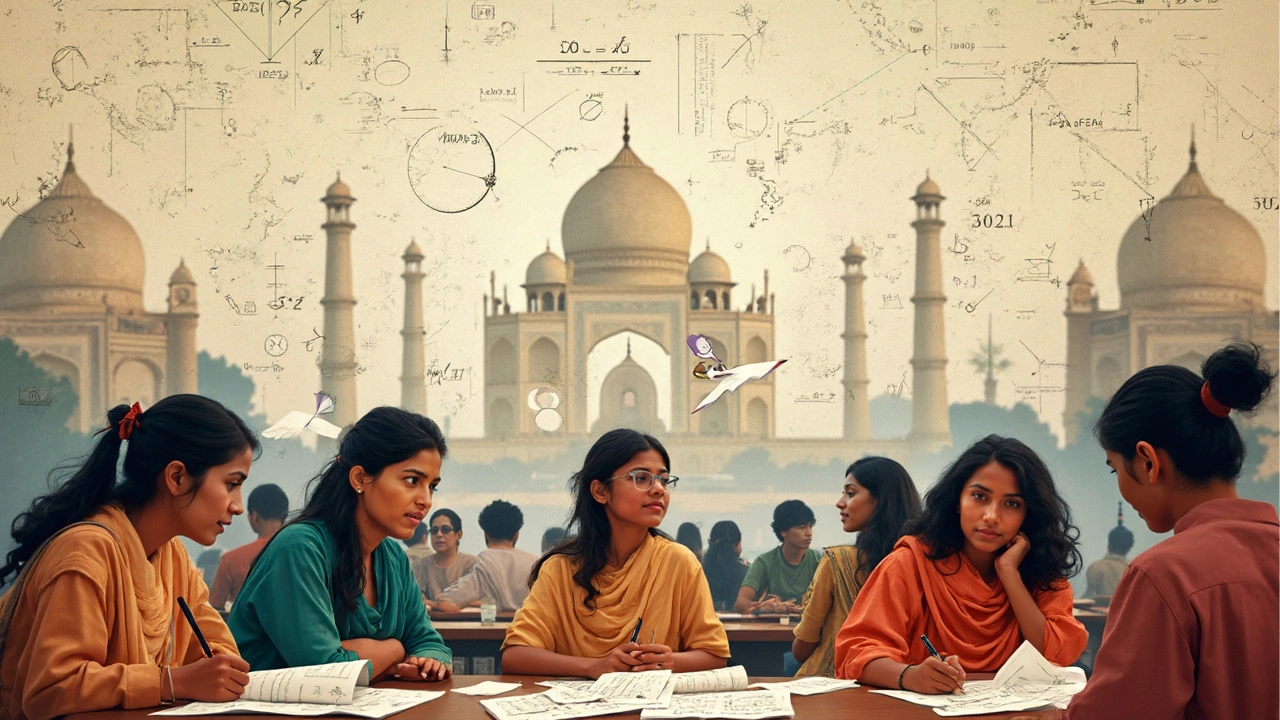Math. It's that four-letter word that can send chills down the spine of even the most hardened student. Ever wondered which country tops the charts when it comes to the toughest math exams? Let's take a journey around the world and explore the notable contenders.
When we talk about challenging math exams, China often pops up in conversation. The Gaokao, China's national college entrance exam, is renowned for its intensity. Students prepare for years to tackle questions that require not just knowledge but deep problem-solving skills. It's like running a marathon for the brain.
Russia, too, has a formidable reputation. With its legacy of producing top mathematicians, Russian math exams emphasize theoretical understanding. Here, students delve into concepts that many of us wouldn't touch with a ten-foot pole.
Why do some countries have such tough exams? It's a mix of educational philosophy and cultural emphasis on STEM subjects. In places where academic excellence is prized, math becomes a proving ground. But don't worry, with the right approach and preparation, you can tackle these challenges head-on!
- Introduction to Global Math Exams
- Notorious Math Competitions
- Highlights from China's Gaokao
- The Russian Math Tradition
- Why Is Math So Hard in Some Countries?
- Tips for Tackling Tough Math Exams
Introduction to Global Math Exams
Math exams around the world differ in style and difficulty, reflecting the diverse educational goals of each country. From the intense competitive exams in Asia to the analytical approaches in Europe, these tests serve as benchmarks of educational standards.
One notable example is the International Mathematics Olympiad (IMO), which has been challenging the brightest young minds since 1959. Competitors from over 100 countries tackle problems that demand ingenuity and advanced math skills. It's a true test of ability beyond regular schooling.
In Asia, exams like China's Gaokao and South Korea's CSAT are infamous for their rigorous math sections. The pressure is immense, as these exams often determine university placements and future career paths. Students are pushed to their limits, solving complex problems under timed conditions.
Across the pond, European countries like France and Germany have their own robust exams. The baccalaureate in France includes math testing that emphasizes both theory and application. These tests encourage critical thinking, rather than rote memorization, preparing students for higher education and careers in math-intensive fields.
In the United States, standardized tests like the SAT and ACT include math sections that focus on a mix of algebra, geometry, and basic trigonometry. While these might seem straightforward compared to other nations' tests, they are pivotal for college admissions.
These global differences in math exams highlight each country's unique educational priorities and the value placed on math as a key skill. Whether it's solving a standardized test problem or a high-level theoretical question, math exams continue to be a significant part of academic life worldwide.
Notorious Math Competitions
Step into the world of competitive exams and you'll find math competitions that are the stuff of legends. These aren’t your run-of-the-mill tests—they’re arenas where the best math minds from around the world come together to solve problems that would make even seasoned mathematicians pause.
The International Mathematical Olympiad (IMO)
The IMO is like the Olympics of math. Held annually, this competition gathers high school students from over 100 countries. Each country sends a team of up to six students, armed with pencils and brains full of math wizardry. Competitors tackle monstrous problems over two days, each with three questions, in fields like geometry and number theory. It's a real brain-buster!
Putnam Competition
The William Lowell Putnam Mathematical Competition isn't for the faint-hearted. Targeting undergraduate students in the US and Canada, this exam is renowned for its difficulty. Participants must solve 12 tough problems, each requiring not just math skills but creative reasoning. More than 4,000 students typically participate, but only a handful score highly.
Chinese Math Olympiad
This one's strictly for the math warriors. The problems are known to be so hard that you could spend hours on a single question. Chinese students often enter this competition prepared by rigorous training, learning methods that closely resemble the art of fine chess moves. It's intense, but it’s also what gives China its rep in the world of math.
What makes these competitions stand out isn’t just the difficulty level but the cult following they have. Entire communities and online forums are dedicated to dissecting past problems and sharing strategies. They’re not just about solving equations—they’re about launching math geniuses into the stratosphere of intellectual glory. So, if you’re up for a challenge, these competitions might just be your Everest!
Highlights from China's Gaokao
When people say math exams are tough, the Gaokao in China is a name that often floats to the top. This exam isn't just a test; it's practically a rite of passage for Chinese students aiming for higher education. But what makes this exam so notorious?
Intensive Preparation
The preparation for the Gaokao is an intense experience that begins years in advance. Students often attend special schools known as 'cramming schools' where the sole focus is getting ready for this behemoth of a test. It's like sports training, but for academic endurance.
The Exam Structure
The math section of the Gaokao isn't your standard pick-a-multiple-choice-exam. Nope. It includes a mix of mandatory questions and electives, allowing students to show their prowess in various topics. The questions delve deep into not just arithmetic but also algebra, geometry, and even probability.
Sample of What's Asked
Let's dive into an example: a question might require you to solve a complex equation while proving a theorem, and then apply it to a real-world scenario. It's problem-solving on steroids!
Impact and Significance
Given its grueling nature, it's no surprise that the Gaokao is taken very seriously. The scores not only dictate universities a student can apply to but often their future career paths too. It may feel like the weight of the world rests on a few hours in that exam room.
Quick Stats on Gaokao
| Year | Number of Test Takers (millions) |
|---|---|
| 2022 | 11.93 |
| 2023 | 12.2 |
The sheer number of students undertaking the Gaokao speaks volumes about its central role in the Chinese education system. With close to 12 million test-takers annually, the competition is fierce, to say the least.
Tackling the Gaokao is no walk in the park, but with dedication and the right strategy, it can be conquered. Anyone who faces up to this challenge has already achieved something monumental.

The Russian Math Tradition
When it comes to competitive exams, Russia holds a special place thanks to its rich tradition in mathematics. This tradition is rooted in a historical emphasis on rigorous education, with a specific focus on cultivating deep analytical thinking and creativity in solving math problems.
Legacy of the Russian Mathematics Olympiad
Russia's serious approach to math is showcased by the annual All-Russian Mathematical Olympiad, a competition that has been shaping young minds since 1961. It's not just a test; it's a pathway for students to dive deep into complex mathematical concepts. Winning here means you're not just good at math exams; you're exceptional.
Participants are challenged with problems beyond typical classroom math. We're talking about puzzles involving algebra, geometry, and number theory that require innovative thinking. Success in these competitions often translates to international recognition, as many Russian students excel in the International Mathematics Olympiad.
Strong Focus in Education
The Russian education system puts a strong emphasis on math from early school years. Students are encouraged to engage in problem-solving from a young age. Schools often have math clubs where students work on challenging problems after school hours. It's an environment that fosters a love for math, quite distinct from some countries where students might view it as just another subject.
What sets Russian math education apart is the way they encourage out-of-the-box thinking. Teachers don't just spoon-feed formulas; they guide students to explore and understand the 'why' behind every equation. This deep understanding helps students cope better when they face hardest math questions in exams.
A Contributing Culture
The culture surrounding mathematics in Russia also contributes to their success. Mathematics is not only seen as a subject but as a crucial tool for various sectors including science, engineering, and economics. This cultural perspective creates a society that respects and values mathematical prowess.
So, if you're ever up for a challenge and want to see where you stand globally, taking a peek into Russian math problems might just be the adventure you're looking for!
Why Is Math So Hard in Some Countries?
Diving into the world of competitive exams, it's clear that math's difficulty isn't just about the numbers. Cultural priorities and educational philosophies play starring roles in shaping these experiences across the globe.
Some countries, like China and Russia, have a deep-rooted emphasis on math, partly because they view it as foundational for national progress in technology and science. This leads to systems where students are rigorously trained to tackle complex problems from a young age.
Educational Culture Matters
Consider education systems where academic success reflects family or societal honor. In such places, students commit extra hours to mastering even the toughest mathematical concepts, driven by both expectations and opportunity for future prospects.
The Emphasis on STEM
In many cases, a strong focus on STEM (Science, Technology, Engineering, Mathematics) leads to rigorous math exams. These subjects are seen as crucial for innovation, so countries invest heavily in education to ensure they produce top-tier mathematicians, scientists, and engineers. In countries like South Korea and Japan, education is highly competitive, and students are expected to perform exceptionally well in math to secure university placements.
Advanced Curriculums
Some systems incorporate advanced curriculums that challenge students beyond just solving problems—they encourage deep understanding and creative application. This approach makes the math exams so difficult, as they test more than memorization—they demand genuine comprehension.
In essence, the toughness of math in certain places is a multi-layered tale. It's about cultural values, educational priorities, and the nation's vision for its future. And while these exams might be daunting, they are also entry tickets to amazing opportunities for many students around the world.
Tips for Tackling Tough Math Exams
Facing a tough math exam can feel daunting, but with the right strategies, you can boost your confidence and your score. Here are some practical tips to help you through.
Break Down the Syllabus
Before you start studying, get to know the exam’s structure. Understand which areas are your strong suits and where you need extra work. Breaking down the syllabus into manageable chunks can make studying less overwhelming.
Practice Makes Perfect
It's a classic tip for a reason. Regular practice will help in honing your problem-solving skills. Use past papers and sample tests that match the format of the competitive exams you're prepping for. The more you practice, the more familiar you’ll become with the types of questions you might face.
Tackle One Topic at a Time
Avoid jumping from algebra to calculus in one study session. Focusing on one topic at a time allows deeper understanding and solidifies your knowledge gradually.
Make a Study Schedule
Consistency is key. Set aside dedicated time for math practice every day. A schedule helps to reinforce discipline, making it easier to track your progress over time.
Use the Right Resources
Leverage resources like online tutorials, study groups, and textbooks that specifically focus on international or national math exams. Don't shy away from asking teachers or classmates for explanations on tricky problems.
Mind Your Mindset
A positive attitude can drastically improve your performance. Remember, every expert was once a beginner. Celebrate small victories along the way to stay motivated.
Exam Day Strategy
On the big day, make sure you read each question carefully. Start with questions you find easy to build confidence, then tackle the tougher ones. Managing your time efficiently is crucial.
So, next time you hear about the world's toughest math exams, don't sweat it. With these strategies, you're better equipped to face the challenge head-on!

